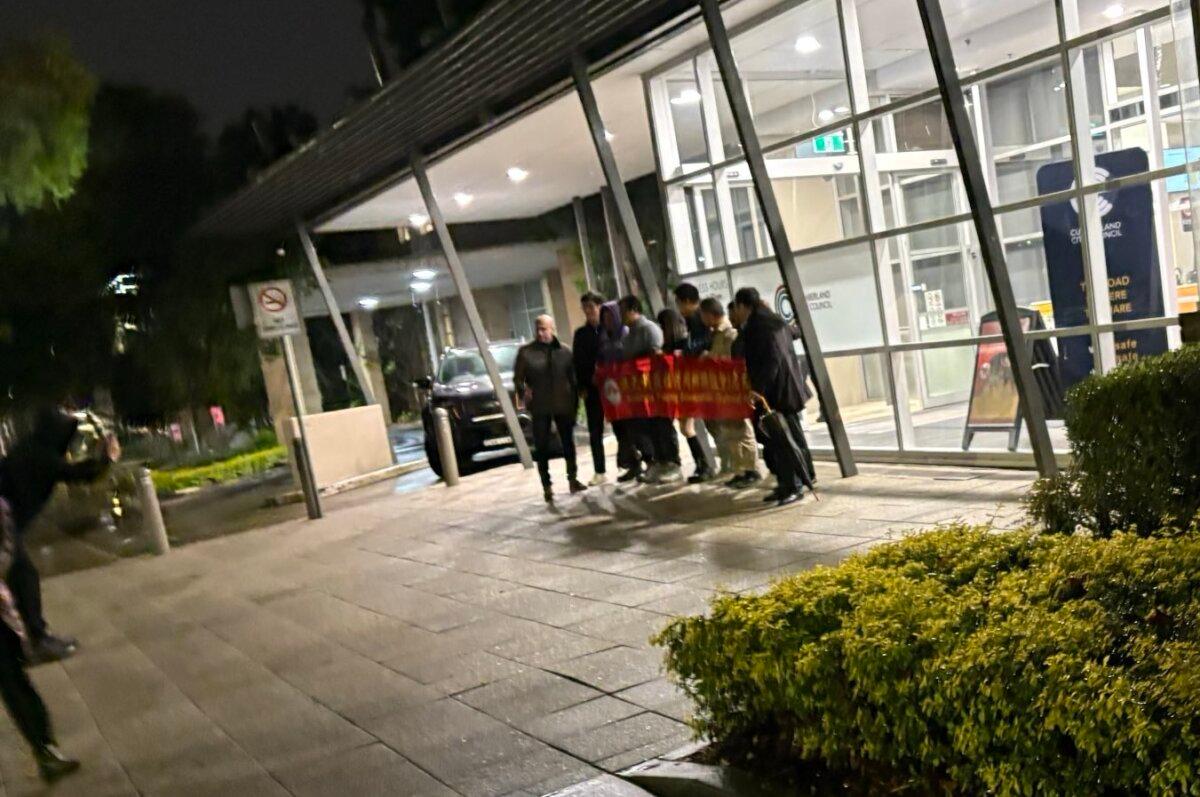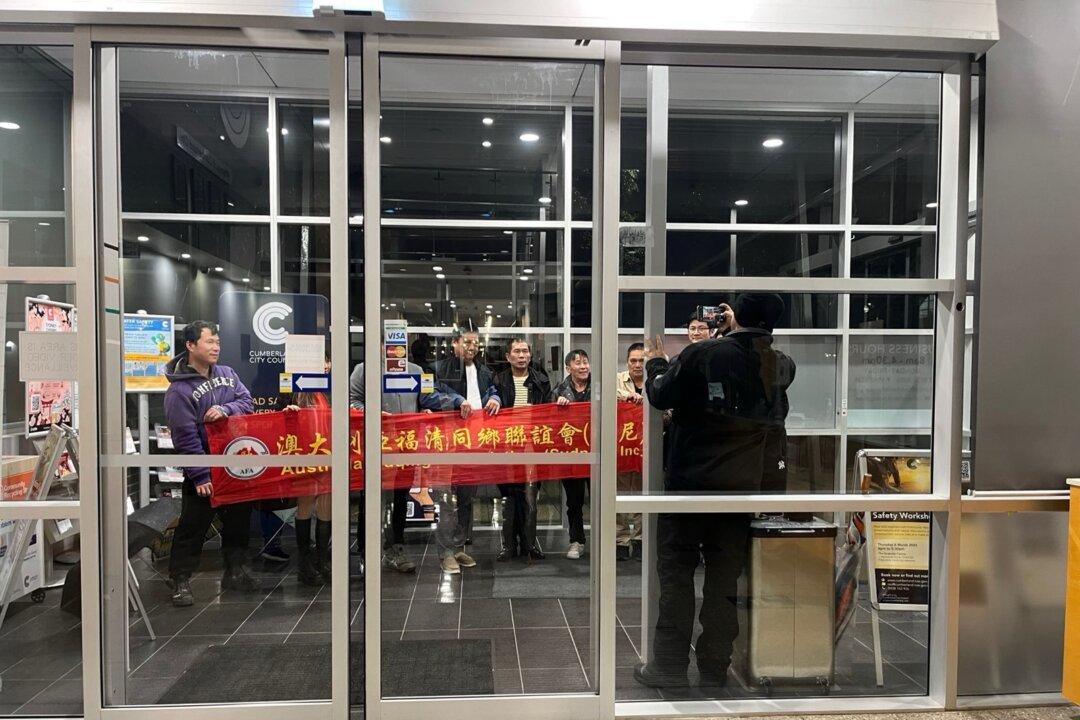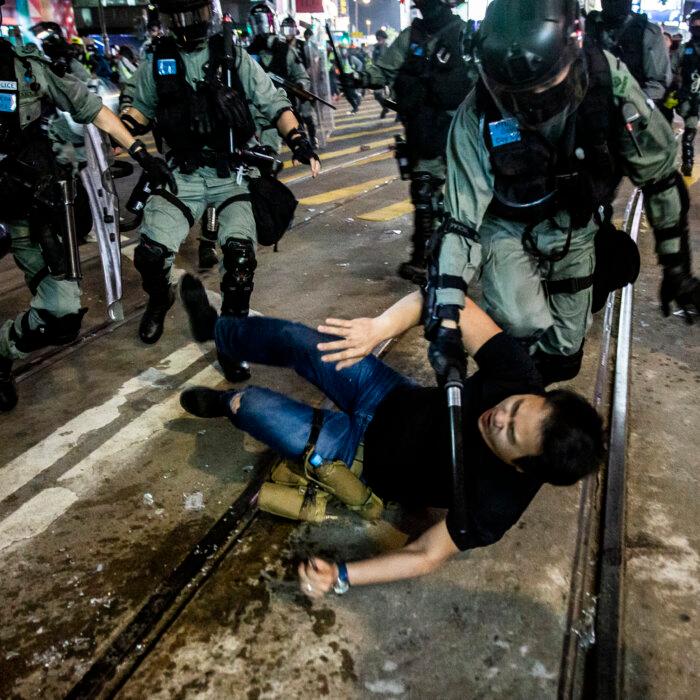Council debates rarely echo with international politics. But a failed motion in Cumberland, Sydney, has done just that—thanks to a group that claims to speak for Chinese Australians, but whose loyalties may lie farther afield.
The “Fuqing” [Fu-ching] Association—named after the relatively small Chinese city of Fuqing—has branches across multiple countries, and appears to be mostly active when it comes to showing support for the Chinese Communist Party’s (CCP) leadership overseas.
On July 30, the Sydney-based group, which claims to represent 10,000 Chinese-Australians, mobilised to oppose a motion being considered by Cumberland City Council in Sydney’s multicultural west.
The motion was aimed at officially recognising “World Falun Dafa Day” as part of the council’s annual cultural program.
Falun Gong, also known as Falun Dafa, is a spiritual practice first taught in China in 1992 and based on the principles of truthfulness, compassion, and tolerance.
With five sets of health-benefiting exercises and moral-guiding teachings, Falun Gong grew rapidly with an estimated 70 million to 100 million people taking it up by 1999.
Perceiving its popularity as a threat, the CCP started a sweeping persecution to eliminate the faith group on July 20, 1999, which continues to this day and has seen the CCP carry out severe human rights abuses, forced organ harvesting, and more recently, transnational repression.
The proposed motion (Item No: C07/25-155) before the Council recommended recognising May 13—the birthday of Li Hongzhi, founder of Falun Dafa—as World Falun Dafa Day, a designation already widely observed in Western democracies such as Canada and the United States to acknowledge the practice’s contributions to the community, including free meditation classes and cultural performances.
The motion did not garner enough support this time around, but The Epoch Times understands councillors will continue to engage with the Falun Dafa community to understand more about the practice.
Some members of the council commented that they had to handle several requests to recognise specific celebrations for different ethnic groups.
After the vote, however, members of the Fuqing Association took photos in front of the council building to celebrate.
Who Are the Fuqing Association And What Are Their Motives?
Fuqing is a county-level city in the coastal Fujian Province, and is home to 1.4 million people.In the Association’s submission against the motion, it called itself the “largest Australian-Chinese community organisation within the Cumberland City Council area, with a membership of over 10,000.” A figure The Epoch Times could not independently verify.
The “hometown” association—voluntary organisations formed by immigrants who share a common place of origin— also claimed to be the “most representative voice of the local Chinese Australian community.”
The group claimed that recognising the motion would “create division.”
The Fuqing group is an active player in CCP politics.

In the same year, the World Fuqing Hometown Association held its 35th anniversary celebration, attended by two members of the United Front Work Department, a CCP organ tasked with influencing overseas politicians and community groups.
The Fuqing group’s latest actions follow the release of an official condemnation against “transnational repression” from the G7 group of nations.
“[Transnational repression or TNR] is an aggressive form of foreign interference whereby states or their proxies attempt to intimidate, harass, harm or coerce individuals or communities outside their borders,” read the official statement.
“It has a chilling effect in our countries. TNR often impacts dissidents, journalists, human rights defenders, religious minorities, and those identified as part of diaspora communities.”
What Started as Benign Became Co-Opted: Professor
Li Yuanhua, a former professor at Capital Normal University in Beijing who is now based in Sydney, said the CCP had taken advantage of Chinese people’s patriotism.
“They were originally genuine hometown associations, formed by people from the same region, but later, most were co-opted by the CCP,” he told The Epoch Times.
“Now, nearly all such associations—over 90 percent—while registered in Australia, are also required to register with the Chinese consulate.
“The leaders of these hometown associations must submit their detailed personal information to the CCP and follow its directives. Many of them are listed as ‘member organisations’ of the Australian Council for the Promotion of the Peaceful Reunification of China, which is widely regarded as one of the CCP’s key overseas front groups.”
He added that the leaders and core members of these organisations are all Australian citizens.
The Council made headlines years ago for its link to billionaire Huang Xiangmo, who was accused of influencing former Labor Senator Sam Dastyari, as well as Yang Dongdong, who heads the similarly named Australian Council for the Promotion of the Reunification of China.
China expert Clive Hamilton has accused Yang himself of nurturing “intimate and long-standing links to the Chinese consulate in Sydney” and has moved to “advance the objectives of the CCP.”
A friend of Yang, Councillor Cedric Spencer of Sydney’s Ku-ring-gai Council, recently attempted to attribute the Liberal Party’s loss of the seat of Bradfield, among other reasons, to the relationship between former federal MP Paul Fletcher and a member of the Falun Gong community.
CCP’s Overseas United Front Tactics
The Fuqing Association’s movements are not in isolation.
Another hometown association, the Hubei Association, is also under investigation for encouraging volunteers to hand out how-to-vote cards for Teal independent Monique Ryan in the Melbourne electorate of Kooyong ahead of the May election.
The Hubei Association has been accused of having ties to the United Front Work Department.
Australian Strategic Policy Institute (ASPI) warned of the dangers of the CCP’s United Front tactics in its 2020 report, “The party speaks for you.”
Authored by Alex Joske, the report reveals that the United Front system extends far beyond China’s borders in a complex, often covert effort to expand its influence among ethnic minorities, religious groups, and political, business, and scientific communities.
“Diplomats might see United Front work as ‘public diplomacy’ or ‘propaganda’ but fail to appreciate the extent of related covert activities. Security officials may be alert to criminal activity or espionage while underestimating the significance of open activities that facilitate it,” Joske wrote.

Councillor Helen Hughes, who voted for the proposed motion to recognise World Falun Dafa Day, said it also served to highlight that the persecution of Falun Dafa is still ongoing.
“This document [from Fuqing Association] doesn’t really give what I consider to be a real reason in any fact. This is not being conscientiously decent for people who are experiencing this—the persecutions, etc.,” she told The Epoch Times.
“It’s just heartbreaking.”
Hughes was moved when she heard a member of the Falun Dafa community tell the council about how she could not return to China after her parents died due to the persecution.
“To have that happen personally, that would be just so heartbreaking, and I really feel for them,” she said. “It genuinely was hurtful that they were not being supported in the level that they ought to be.”
The Australian Security Intelligence Organisation (ASIO) told The Epoch Times that, consistent with long-standing practice, it does not comment on specific groups or individuals.
Attempts to contact the Sydney branch of the Fuqing Association for comment were unsuccessful, as no official website or publicly listed contact details could be found.






